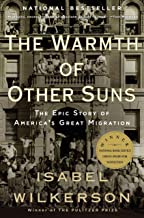 The Warmth of Other Suns: The Epic Story of America’s Great Migration
The Warmth of Other Suns: The Epic Story of America’s Great Migration
by Isabel Wilkerson
From 1915 to 1970, this exodus of almost six million people changed the face of America. Wilkerson compares this epic migration to the migrations of other peoples in history. She interviewed more than a thousand people, and gained access to new data and official records, to write this definitive and vividly dramatic account of how these American journeys unfolded, altering our cities, our country, and ourselves.
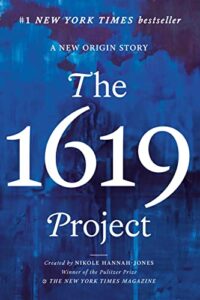 The 1619 Project: A New Origin Story by Nikole Hannah-Jones
The 1619 Project: A New Origin Story by Nikole Hannah-Jones
The New York Times Magazine’s award-winning “1619 Project” issue reframed our understanding of American history by placing slavery and its continuing legacy at the center of our national narrative. This new book substantially expands on that work, weaving together eighteen essays that explore the legacy of slavery in present-day America with thirty-six poems and works of fiction that illuminate key moments of oppression, struggle, and resistance. The essays show how the inheritance of 1619 reaches into every part of contemporary American society, from politics, music, diet, traffic, and citizenship to capitalism, religion, and our democracy itself.
A podcast from NPR contains an interview with the author and discusses the background to the project as well as her response to the criticism and push back it has received. NPR podcast interview with Nikole Hannah-Jones
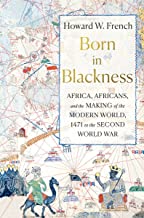 Born in Blackness: Africa, Africans, and the Making of the Modern World, 1471 to the Second World War. by Howard W. French
Born in Blackness: Africa, Africans, and the Making of the Modern World, 1471 to the Second World War. by Howard W. French
Revealing the central yet intentionally obliterated role of Africa in the creation of modernity, Born in Blackness vitally reframes our understanding of world history.
Traditional accounts of the making of the modern world afford a place of primacy to European history. Some credit the fifteenth-century Age of Discovery and the maritime connection it established between West and East; others the accidental unearthing of the “New World.” Still others point to the development of the scientific method, or the spread of Judeo-Christian beliefs; and so on, ad infinitum. The history of Africa, by contrast, has long been relegated to the remote outskirts of our global story. What if, instead, we put Africa and Africans at the very center of our thinking about the origins of modernity?
In a sweeping narrative spanning more than six centuries, Howard W. French does just that, for Born in Blackness vitally reframes the story of medieval and emerging Africa, demonstrating how the economic ascendancy of Europe, the anchoring of democracy in the West, and the fulfillment of so-called Enlightenment ideals all grew out of Europe’s dehumanizing engagement with the “dark” continent. In fact, French reveals, the first impetus for the Age of Discovery was not―as we are so often told, even today―Europe’s yearning for ties with Asia, but rather its centuries-old desire to forge a trade in gold with legendarily rich Black societies sequestered away in the heart of West Africa.
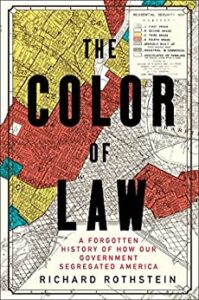 The Color of Law: A Forgotten History of How Our Government Segregated America by Richard Rothstein
The Color of Law: A Forgotten History of How Our Government Segregated America by Richard Rothstein
This “powerful and disturbing history” exposes how American governments deliberately imposed racial segregation on metropolitan areas nationwide
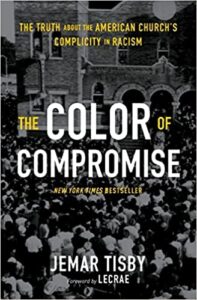 The Color of Compromise: The Truth about the American Church’s Complicity in Racism by Jemar Tisby
The Color of Compromise: The Truth about the American Church’s Complicity in Racism by Jemar Tisby
An acclaimed, timely narrative of how people of faith have historically–up to the present day–worked against racial justice. And a call for urgent action by all Christians today in response.
The Color of Compromise is both enlightening and compelling, telling a history we either ignore or just don’t know. Equal parts painful and inspirational, it details how the American church has helped create and maintain racist ideas and practices. You will be guided in thinking through concrete solutions for improved race relations and a racially inclusive church.
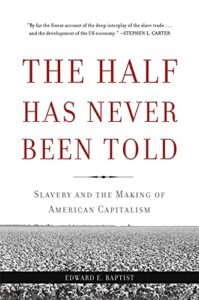 The Half Has Never Been Told: Slavery and the Making of American Capitalism by Edward Baptist
The Half Has Never Been Told: Slavery and the Making of American Capitalism by Edward Baptist
A groundbreaking history demonstrating that America’s economic supremacy was built on the backs of slaves.
Americans tend to cast slavery as a pre-modern institution — the nation’s original sin, perhaps, but isolated in time and divorced from America’s later success. But to do so robs the millions who suffered in bondage of their full legacy. As historian Edward E. Baptist reveals in The Half Has Never Been Told, the expansion of slavery in the first eight decades after American independence drove the evolution and modernization of the United States. In the span of a single lifetime, the South grew from a narrow coastal strip of worn-out tobacco plantations to a continental cotton empire, and the United States grew into a modern, industrial, and capitalist economy.
Told through intimate slave narratives, plantation records, newspapers, and the words of politicians, entrepreneurs, and escaped slaves, The Half Has Never Been Told offers a radical new interpretation of American history.
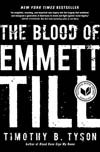 The Blood of Emmett Till by Timothy B. Tyson
The Blood of Emmett Till by Timothy B. Tyson
In 1955, white men in the Mississippi Delta lynched a fourteen-year-old from Chicago named Emmett Till. His murder was part of a wave of white terrorism in the wake of the 1954 Supreme Court decision that declared public school segregation unconstitutional. Only weeks later, Rosa Parks thought about young Emmett as she refused to move to the back of a city bus in Montgomery, Alabama. Five years later, Black students who called themselves “the Emmett Till generation” launched sit-in campaigns that turned the struggle for civil rights into a mass movement. Till’s lynching became the most notorious hate crime in American history.
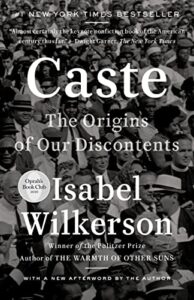 Caste: The Origins of Our Discontents by Isabel Wilkerson
Caste: The Origins of Our Discontents by Isabel Wilkerson
In this brilliant book, Isabel Wilkerson gives us a masterful portrait of an unseen phenomenon in America as she explores, through an immersive, deeply researched, and beautifully written narrative and stories about real people, how America today and throughout its history has been shaped by a hidden caste system, a rigid hierarchy of human rankings.
Beyond race, class, or other factors, there is a powerful caste system that influences people’s lives and behavior and the nation’s fate.
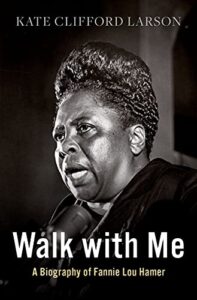 Walk with Me: A Biography of Fannie Lou Hamer by Kate Clifford Larson
Walk with Me: A Biography of Fannie Lou Hamer by Kate Clifford Larson
She was born the 20th child in a family that had lived in the Mississippi Delta for generations, first as enslaved people and then as sharecroppers. She left school at 12 to pick cotton, as those before her had done, in a world in which white supremacy was an unassailable citadel. She was subjected without her consent to an operation that deprived her of children. And she was denied the most basic of all rights in Americathe right to cast a ballot in a state in which Blacks constituted nearly half the population.
And so Fannie Lou Hamer lifted up her voice. Starting in the early 1960s and until her death in 1977, she was an irresistible force, not merely joining the swelling wave of change brought by civil rights but keeping it in motion.
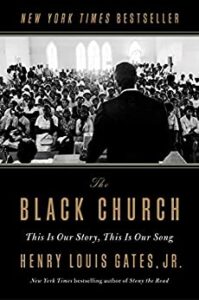 The Black Church: This Is Our Story, This Is Our Song by Henry Louis Gates Jr.
The Black Church: This Is Our Story, This Is Our Song by Henry Louis Gates Jr.
a powerful new history of the Black church as a foundation of Black life and a driving force in the larger freedom struggle in America.
Also (may be) available as a movie from PBS https://www.pbs.org/weta/black-church/
The Road to Freedom
The Road to Freedom highlights Virginia’s Civil War-era African American experience, encouraging visitors and Virginians alike to uncover these little-known stories of strife, growth, community, and more. It unleashes the power of both perspective and place and introduces historical figures that have been given little voice until now. This application allows you to interact with these stories in various ways. You can explore the Road to Freedom sites at large, read of the illuminating narratives derived from the print brochure below, and investigate the state’s history through tour collections for particular Virginia cities and themes.
Developed through a partnership between the American Battlefield Trust and Civil War Trails, this application came about as a supplemental resource to the printed Road to Freedom map and brochure, available in visitor centers across the Commonwealth. Its purpose is to demonstrate the diverse history of Virginia and give autonomy to the African American experience.
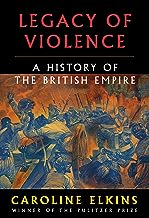 Legacy of Violence: A History of the British Empire by Caroline Elkins
Legacy of Violence: A History of the British Empire by Caroline Elkins
Sprawling across a quarter of the world’s land mass and claiming nearly seven hundred million people, Britain’s twentieth-century empire was the largest empire in human history. For many Britons, it epitomized their nation’s cultural superiority. But what legacy did the island nation deliver to the world? Covering more than two hundred years of history, Caroline Elkins reveals an evolutionary and racialized doctrine that espoused an unrelenting deployment of violence to secure and preserve the nation’s imperial interests. She outlines how ideological foundations of violence were rooted in the Victorian era calls for punishing recalcitrant “natives,” and how over time, its forms became increasingly systematized. And she makes clear that when Britain could no longer maintain control over the violence it provoked and enacted, it retreated from empire, destroying and hiding incriminating evidence of its policies and practices.
